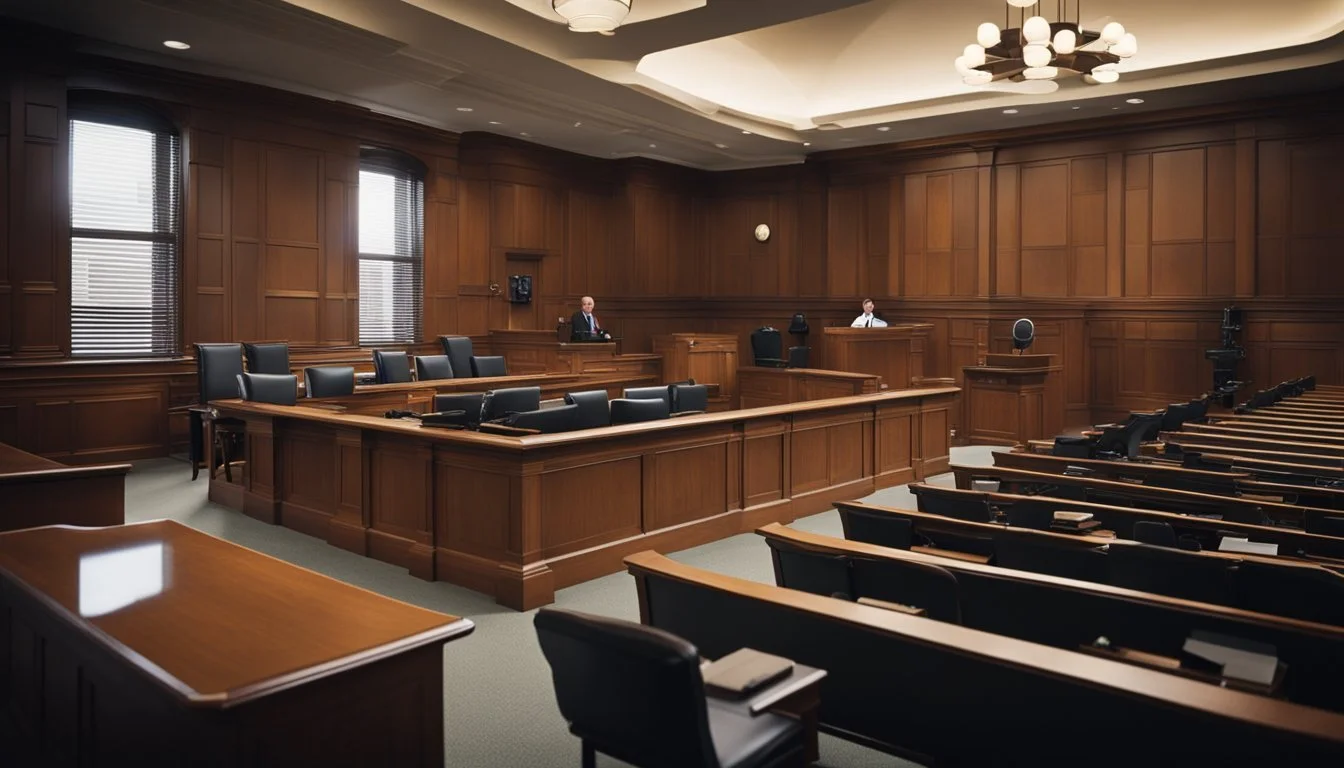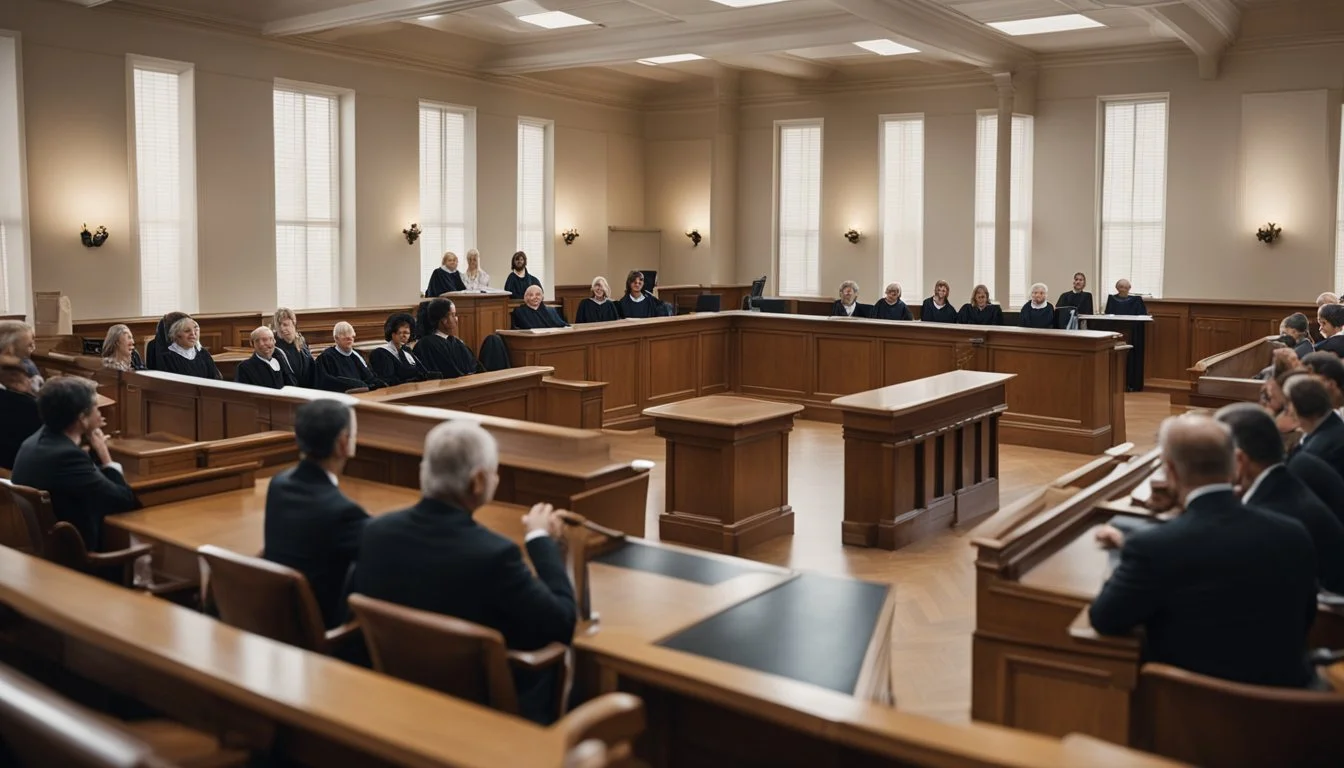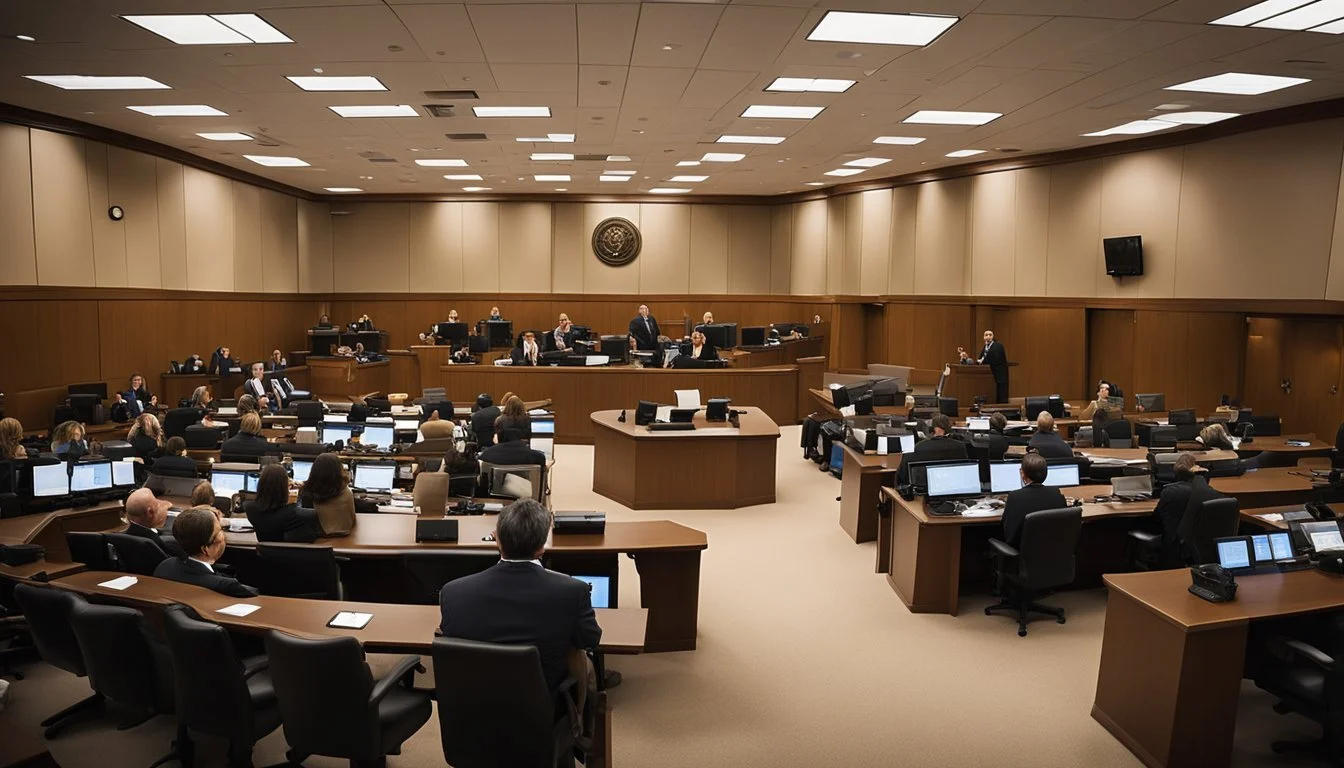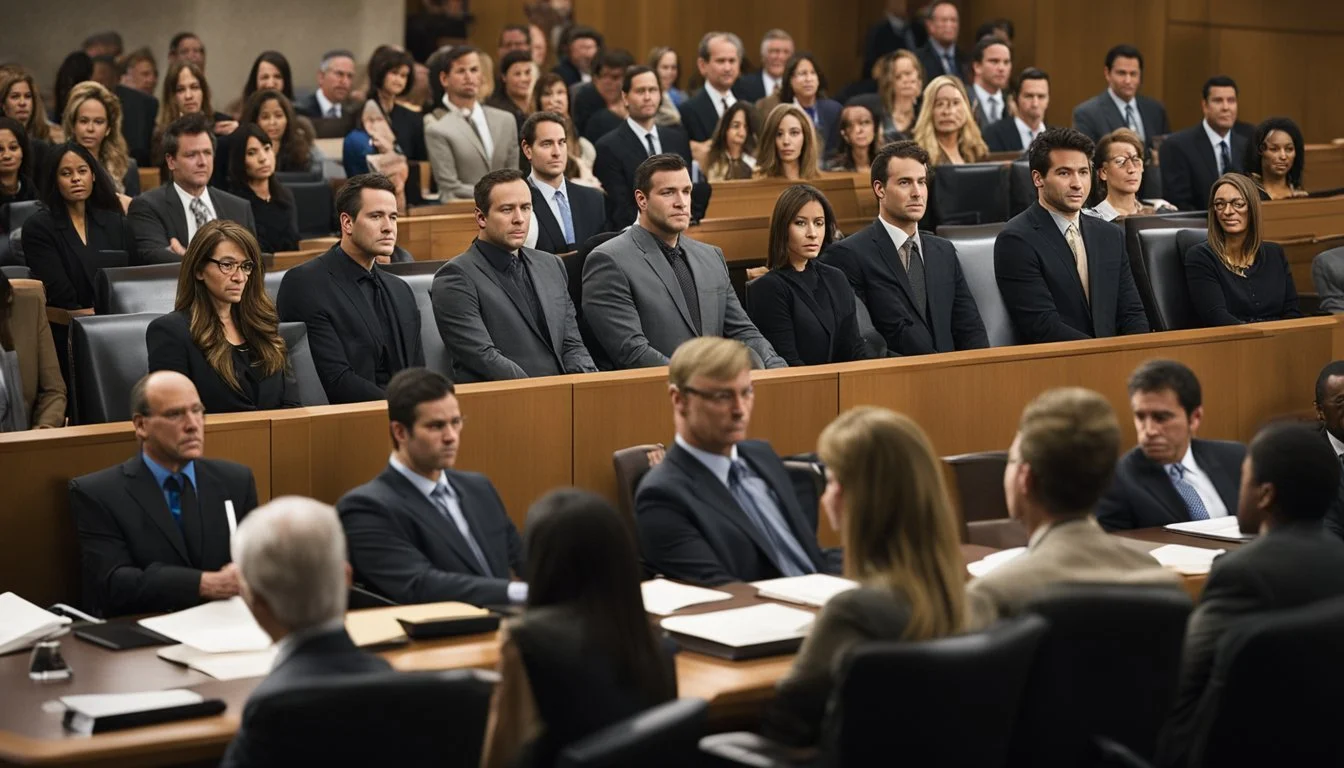Unraveling Obsession: Documentaries Expose the Jodi Arias Trial
The Jodi Arias murder trial captivated America in 2013, becoming one of the most high-profile cases in recent memory. The sensational nature of the crime and subsequent legal proceedings sparked intense media coverage and public interest. This fascination has led to the creation of numerous documentaries exploring different aspects of the case.
These documentaries offer viewers an in-depth look at the trial, the individuals involved, and the broader societal implications of the case. They examine the evidence presented, delve into the backgrounds of both Jodi Arias and victim Travis Alexander, and analyze the legal strategies employed by both the prosecution and defense. Through interviews, archival footage, and expert commentary, these films provide audiences with a comprehensive overview of this complex and controversial case.
1) "The Jodi Arias Story" by ABC 20/20 (2013)
ABC's 20/20 produced "The Jodi Arias Story" to cover the high-profile murder trial that captivated the nation. The documentary delves into the relationship between Jodi Arias and Travis Alexander.
It explores the events leading up to Alexander's brutal killing in 2008. The program features interviews with friends and family of both Arias and Alexander, providing insight into their tumultuous relationship.
Law enforcement officials and legal experts offer their perspectives on the case. The documentary examines key evidence presented during the trial, including photographs and recordings.
"The Jodi Arias Story" highlights the media frenzy surrounding the case and its impact on public opinion. It also discusses Arias' changing accounts of the events and her eventual conviction.
The program aims to present a comprehensive overview of this complex and controversial case. It offers viewers a deeper understanding of the circumstances that led to this tragic outcome.
2) "Snapped: Jodi Arias" by Oxygen (2013)
Oxygen Media produced a two-part special of their true crime series "Snapped" focused on Jodi Arias. The program aired in December 2013, following Arias' conviction for first-degree murder earlier that year.
"Snapped: Jodi Arias" examined the fatal relationship between Arias and Travis Alexander. It explored the events leading up to Alexander's brutal killing in 2008 and the subsequent investigation.
The documentary provided an in-depth look at the high-profile trial that captured national attention. It featured interviews with key figures involved in the case and analyzed the evidence presented in court.
Viewers gained insight into Arias' background and her volatile romance with Alexander. The program also highlighted the prosecution's case against Arias and her controversial testimony during the trial.
"Snapped: Jodi Arias" offered a comprehensive overview of one of the most publicized murder trials in recent American history. It aimed to present a balanced account of the case that fascinated the public.
3) "Jodi Arias: Dirty Little Secret" by Lifetime (2013)
"Jodi Arias: Dirty Little Secret" is a Lifetime original movie that dramatizes the events surrounding the murder of Travis Alexander. The film stars Tania Raymonde as Jodi Arias and Jesse Lee Soffer as Travis Alexander.
The movie focuses on the tumultuous relationship between Arias and Alexander, leading up to the brutal killing. It depicts Arias as a seductive and obsessive figure who becomes increasingly unstable.
Key elements of the case are portrayed, including the discovery of incriminating photographs on Alexander's camera. The film also touches on the subsequent police investigation and trial.
While based on true events, "Dirty Little Secret" takes some creative liberties for dramatic effect. It aims to provide viewers with a fictionalized account of the high-profile murder case.
The movie premiered on Lifetime in 2013, coinciding with the widespread public interest in the ongoing trial. It offers a dramatized perspective on the crime that captivated the nation.
4) "Murder Made Me Famous: Jodi Arias" by Reelz (2015)
"Murder Made Me Famous: Jodi Arias" is a television documentary that aired on the Reelz channel. It explores the high-profile murder case of Travis Alexander and the subsequent trial of his ex-girlfriend, Jodi Arias.
The documentary delves into the details of the crime, which occurred in 2008. It examines the relationship between Arias and Alexander, providing context for the events leading up to the murder.
Viewers are presented with key evidence from the case, including photographs and recordings. The program also features interviews with individuals connected to the investigation and trial.
The documentary highlights the media frenzy surrounding the case. It explores how Arias became a subject of intense public fascination during her trial in 2013.
"Murder Made Me Famous: Jodi Arias" offers a comprehensive look at one of the most notorious murder cases in recent American history. It aims to provide viewers with a deeper understanding of the events and personalities involved.
More information on the Jodi Arias case
5) "Jodi Arias: An American Murder Mystery" by Investigation Discovery (2018)
"Jodi Arias: An American Murder Mystery" is a three-part documentary series produced by Investigation Discovery. It examines the high-profile murder case of Travis Alexander and the subsequent trial of Jodi Arias.
The series delves into the brutal nature of Alexander's murder, which left investigators puzzled. It features interviews with key figures involved in the case, including Arias's former lawyer.
Viewers gain insight into the relationship between Arias and Alexander through explicit audio and video evidence presented during the trial. The documentary also explores how Arias became a media sensation as the proceedings unfolded.
The series highlights the dramatic shifts in Arias's story throughout the investigation and trial. It presents a comprehensive look at the case that captivated the American public.
"Jodi Arias: An American Murder Mystery" offers a detailed examination of one of the most notorious crimes in recent American history. It provides viewers with an in-depth understanding of the events surrounding the murder and trial.
6) "Dateline NBC: Obsession" by NBC (2013)
"Dateline NBC: Obsession" is a television documentary that aired on May 10, 2013. It offers an in-depth examination of the Jodi Arias case and trial.
The program is hosted by Josh Mankiewicz, a veteran journalist known for his work on true crime stories. Mankiewicz provides a detailed look into the events surrounding the murder of Travis Alexander.
The documentary explores Arias's background and her relationship with Alexander. It presents interviews with key figures involved in the case and analyzes the evidence presented during the trial.
"Dateline NBC: Obsession" stands out for its comprehensive coverage of the case. It offers viewers a balanced perspective on the complex and controversial trial that captivated the nation.
The documentary uses archival footage, court recordings, and expert commentary to reconstruct the events leading up to the murder and the subsequent legal proceedings.
More information about Dateline NBC
7) "Jodi Arias: Cellmate Secrets" by Lifetime (2020)
Lifetime's "Jodi Arias: Cellmate Secrets" offers a unique perspective on the convicted murderer. The documentary aired on August 8, 2020, providing new insights into Arias's life behind bars.
The special features interviews with two of Arias's former cellmates. These women became close to Arias during their time in prison together, offering firsthand accounts of their experiences.
The documentary explores previously undisclosed information about Arias and the murder of her ex-boyfriend, Travis Alexander. It sheds light on Arias's behavior and relationships within the prison system.
"Cellmate Secrets" is part of Lifetime's broader true crime documentary series. It aims to provide viewers with a deeper understanding of high-profile criminals through the eyes of those who interacted with them closely.
The film adds to the extensive media coverage of the Jodi Arias case, which has captivated public interest since the 2013 trial. It offers a fresh angle on a story that continues to intrigue audiences years after the verdict.
More information on Jodi Arias: Cellmate Secrets
8) "Evil Up Close: Jodi Arias" by Quest Red (2019)
"Evil Up Close: Jodi Arias" presents a detailed examination of the notorious murder case. The documentary, produced by Quest Red, offers viewers an in-depth look at the events surrounding Travis Alexander's death.
The film explores Jodi Arias's background and her relationship with Alexander. It features interviews with key figures involved in the case, including detectives, attorneys, and family members.
Quest Red's production delves into the evidence presented during the trial. It analyzes the crime scene, forensic findings, and Arias's conflicting statements to law enforcement.
The documentary also examines the media frenzy that surrounded the trial. It highlights how public opinion shifted as new details emerged throughout the legal proceedings.
"Evil Up Close: Jodi Arias" provides a balanced perspective on the case. It presents various theories and allows viewers to form their own conclusions about the events that transpired.
More information about "Evil Up Close: Jodi Arias" on IMDB
9) "Jodi Arias: Young, Beautiful, and Guilty?" by HLN (2013)
HLN produced this documentary as part of their coverage of the high-profile Jodi Arias murder trial. The film examines the case against Arias and the evidence presented during her trial for the killing of Travis Alexander.
The documentary features interviews with legal experts, journalists, and individuals close to the case. It delves into Arias's background and her relationship with Alexander, providing context for the events leading up to the murder.
HLN's production explores key pieces of evidence, including photographs, text messages, and forensic findings. It also highlights pivotal moments from the trial, such as Arias's testimony and the prosecution's arguments.
The film presents a balanced view of the case, allowing viewers to form their own opinions about Arias's guilt or innocence. It offers insights into the legal strategies employed by both the prosecution and defense teams.
"Young, Beautiful, and Guilty?" captures the media frenzy surrounding the trial and its impact on public perception of the case. The documentary serves as a comprehensive overview of one of the most widely publicized murder trials of the decade.
More information on the Jodi Arias case
10) "Vengeance: Killer Lovers - Jodi Arias" by HLN (2013)
HLN produced this documentary as part of their "Vengeance" series focusing on notorious crimes. The film explores the Jodi Arias murder case in detail, presenting key evidence and testimony from the trial.
Interviews with legal experts, investigators, and individuals close to the case provide insight into the events surrounding Travis Alexander's death. The documentary examines Arias's background and her relationship with Alexander.
It delves into the forensic evidence presented at trial, including the gruesome crime scene photos and Arias's conflicting statements to police. The film also covers the media frenzy that surrounded the case and its impact on public perception.
Viewers gain an understanding of the prosecution and defense strategies during the high-profile trial. The documentary highlights pivotal moments in the courtroom and analyzes Arias's behavior on the witness stand.
More information on HLN's "Vengeance" series
Background of the Jodi Arias Case
The Jodi Arias case shocked the nation with its mix of romance, betrayal, and violence. It began with a brutal murder in 2008 and evolved into a high-profile trial that captivated the public's attention.
The Crime Details
On June 4, 2008, Travis Alexander was found dead in his Mesa, Arizona home. The 30-year-old motivational speaker and devout Mormon had been stabbed multiple times, his throat was slit, and he had suffered a gunshot wound to the head.
The crime scene was particularly gruesome, with blood evidence throughout the bathroom where Alexander's body was discovered. Investigators found a camera in the washing machine, which later provided crucial photographic evidence.
Initial Investigation
Jodi Arias quickly became the prime suspect in Alexander's murder. The two had been in an on-again, off-again relationship marked by intense passion and religious conflict.
Arias initially denied any involvement in the crime. She later changed her story, claiming she was present during a home invasion that resulted in Alexander's death. As evidence mounted against her, Arias finally admitted to killing Alexander but claimed it was in self-defense.
Police found Arias's palm print in blood at the crime scene, along with her hair and DNA. The recovered camera contained photos of both Arias and Alexander taken on the day of the murder.
Legal Battles
The trial of Jodi Arias began on January 2, 2013, and quickly became a media sensation. Prosecutors sought the death penalty, arguing that the killing was premeditated and exceptionally cruel.
Arias took the stand in her own defense, testifying for 18 days. She painted Alexander as abusive and claimed she killed him in self-defense after he attacked her.
The trial lasted five months and included graphic evidence and testimony about the couple's sexual relationship. On May 8, 2013, the jury found Arias guilty of first-degree murder.
The sentencing phase proved challenging, with two hung juries unable to decide on the death penalty. In April 2015, Arias was finally sentenced to life in prison without the possibility of parole.
Media Coverage of the Trial
The Jodi Arias murder trial garnered unprecedented media attention, captivating audiences across various platforms. Television networks, social media, and public discourse were all heavily influenced by the high-profile case.
Television Programs
Court TV provided extensive live coverage of the Jodi Arias trial, broadcasting testimony and courtroom proceedings to millions of viewers. Major news networks like CNN, Fox News, and HLN dedicated significant airtime to analyzing the case.
Nancy Grace, a prominent legal commentator, featured the trial prominently on her show. Her provocative commentary and interviews with experts contributed to heightened public interest.
Documentary specials aired on networks like Discovery+ and Investigation Discovery, offering in-depth looks at the case and its key players.
Social Media Influence
Twitter became a hub for real-time discussions about the trial, with hashtags like #JodiArias trending regularly. Users shared opinions, debated evidence, and reacted to courtroom developments.
Facebook groups dedicated to the case sprouted up, allowing members to dissect testimony and share theories. Some of these groups amassed thousands of followers.
YouTube channels emerged, offering analysis and commentary on the trial. Amateur sleuths and legal experts alike shared their perspectives through video content.
Public Reactions
The trial sparked intense emotional responses from the public. Many expressed outrage at Arias and sympathy for the victim, Travis Alexander.
Some supporters of Arias emerged, questioning the prosecution's case and advocating for her innocence. This led to heated online debates and discussions.
Local Arizona residents held vigils and demonstrations outside the courthouse, showing support for Alexander's family and calling for justice.
The media coverage and public interest in the case raised questions about the impact of extensive publicity on the judicial process and the ability to conduct fair trials in high-profile cases.
Impact and Legacy
The Jodi Arias trial left a lasting mark on the legal system, public perception of domestic violence, and true crime media. Its widespread coverage and controversial nature sparked changes in courtroom procedures, psychological discussions, and popular culture.
Changes in Legal Procedures
The high-profile nature of the Jodi Arias trial led to several procedural adjustments in Arizona courts. Live-streaming of trials became more restricted to protect jury anonymity and prevent outside influences. Courts implemented stricter vetting processes for potential jurors to minimize bias from pre-trial publicity.
Social media policies for jurors were tightened, with clearer instructions on avoiding online discussions about cases. The trial also highlighted the importance of managing lengthy proceedings, prompting discussions on time limits for testimony and cross-examinations.
These changes aimed to ensure fairer trials in the age of instant information and media scrutiny.
Psychological Analysis
The Arias trial brought increased attention to forensic psychology and its role in criminal cases. Experts dissected Arias's behavior, sparking public interest in personality disorders and criminal profiling.
The case highlighted the complexities of domestic violence, challenging stereotypes about perpetrators and victims. It prompted discussions on recognizing signs of abusive relationships and the psychological impact of prolonged abuse.
Mental health professionals used the trial to educate the public about topics like narcissism, manipulation, and the reliability of memory in traumatic situations. This led to broader conversations about mental health awareness and treatment.
Cultural Impact
The Jodi Arias trial became a media sensation, influencing true crime content across various platforms. It inspired numerous books, documentaries, and TV specials, contributing to the genre's popularity.
The case entered pop culture references, appearing in TV shows and podcasts. It sparked debates on the ethics of sensationalizing criminal trials and the impact on victims' families.
Social media played a significant role, with hashtags and online communities forming around the trial. This digital engagement changed how the public interacts with high-profile cases, blurring lines between news and entertainment.
The trial's legacy continues to shape discussions on justice, media responsibility, and public fascination with true crime stories.






